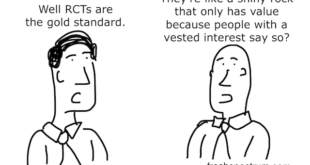from Lars Syll Beyond the significant financial expenses required to conduct RCTs … critics have raised concerns about considerable opportunity costs associated with their privileged status in programme and policy assessment. These costs result from how an over-emphasis on experimental evaluations in evidence generation systematically undermines alternative research methods potentially better equipped to answer questions about causal mechanisms (or the channels by which interventions work...
Read More »The economic crisis and unfolding disaster in Argentina
The population of Argentina is suffering. The purchasing power of people who still have a job is down (a lot), and unemployment must have doubled (it was 5,7% in the last quarter of 2023) if it has not tripled. Less government spending, less consumer spending, and, no doubt, less private investment means that Argentina is experiencing an economic disaster which will scar the country for decades. Retail sales (volume): down around 20% while, at this moment, people will still be able to...
Read More »We can’t have a new paradigm as long as people think the old one was free-market fundamentalism
from Dean Baker The belief in free-market fundamentalism runs very deep. When I say that, I don’t mean that support for the concept runs deep, I mean the belief that we had been pursuing free-market policies in the years before the Trump and Biden presidency runs very deep. I was reminded of this fact in a New York Times column by Farah Stockman, touting the development of a new post-free-market fundamentalist paradigm. To be...
Read More »MMT — the key insights
from Lars Syll As has become abundantly clear during the last couple of years, it is obvious that most mainstream economists seem to think that Modern Monetary Theory is something new that some wild heterodox economic cranks have come up with. That is actually very telling about the total lack of knowledge of their own discipline’s history these modern mainstream guys like Summers, Rogoff and Krugman have. New? Cranks? Reading one of the founders of neoclassical economics, Knut Wicksell,...
Read More »Why economics is such an impossible science
from Lars Syll In a word, Economics is an Impossible Science because by its own definition the determining conditions of the economy are not economic: they are “exogenous.” Supposedly a science of things, it is by definition without substance, being rather a mode of behavior: the application of scarce means to alternative ends so as to achieve the greatest possible satisfaction—neither means, ends, nor satisfaction substantially specified. Exogenous, however, is the culture, all those...
Read More »Our meaningless modern lives: Part 1
from Asad Zaman and WEA Pedagogy Blog The Most Valuable Kind of Knowledge These lectures aim to provide the reader with knowledge. But what is knowledge? Our lives consist of a small number of infinitely precious moments. What makes it worthwhile to invest these moments in the acquisition of knowledge? Is it the kind of knowledge that can teach us how to lead better lives—how to make the most of the few moments that we have? This has been the central preoccupation of philosophers and...
Read More »The productivity/pay gap and phony debates
from Dean Baker New York Times columnist Peter Coy did a piece yesterday questioning the existence of a gap between productivity growth and the typical worker’s pay. This gap was established decades ago by my friends and former colleagues at the Economic Policy Institute (EPI). The fact that it is now being questioned says a lot about economics and even more about politics in this country. First, let me be clear, my purpose is not at all to beat up on Coy. I’ve known him for many years...
Read More »Deaths of infants and young children in Gaza. A fact-based estimate.
To the death toll of the violence in Gaza, around 15.000 additional deaths of infants and children between 1 and 5 have to be added. This is a rough and, in my opinion, a lower-bound estimate. However, the calculations are based on robust information, and sizeable additional mortality in infants and young children in Gaza is real. Next to the direct victims of war, there are indirect victims who die because of lack of proper medical care or because of harsh circumstances. Here, I´ll...
Read More »Perinomics: a yet to exist discipline
from Edward Fullbrook Humankind urgently needs a new discipline. Our very survival may depend on it. Natural science tells us that the economy now threatens humanity with calamity and potentially with extinction; and the daily news tells us that the economy’s forty-year upward redistribution of wealth, income and power threatens democracy and social order. But meanwhile the only discipline that directly engages with today’s economy is the one whose “wisdom” has guided it to its present...
Read More »In praise of pluralism
from Lars Syll Recognition of the speculative value of counterfactualizing provides the grounding for a defense of theoretical pluralism in economics. The existence of multiple contending theories in economics is inconvenient, of course. It casts doubt on the truth content of the counterfactual scenarios generated by the predominant approach and challenges the predominant causal claims … But that is precisely the virtue of contending theoretical perspectives in economics. They serve to...
Read More » Real-World Economics Review
Real-World Economics Review






